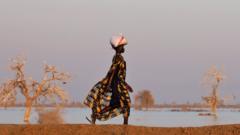In the grasslands of South Sudan, herders are faced with a dire predicament as they scoop murky water from ponds tainted with oil chemicals. Chief Chilhok Puot acknowledges the dangers, saying, "The water is dirty because this place has oil." The situation has reached a breaking point, with community members like Nyatabah stating, "If you drink it, it makes you pant and cough. We know it's bad water, but we don't have anywhere else; we're dying of thirst."
A former oil engineer, David Bojo Leju, emphasized the tragic consequences of flooding in Unity State, which floods have worsened, alleging it's washing pollution into local water sources. With the region continuously inundated due to climate change, many communities are now realizing the intersection of water scarcity and oil contamination.
Unity State, rich in oil resources, has faced unprecedented flooding since 2019, leading to the submersion of large areas, where about 40% of the land remains underwater. These floods have led to observable health impacts and a livestock death toll exceeding 100,000 due to the combination of environmental disasters and oil pollution.
Leju, who previously worked for the oil consortium Greater Pioneer Operating Company, relayed the concerning negligence surrounding oil spills and "produced water," which he claims is injected back into the environment without proper treatment. Regular contamination occurs, and locals express fears for their livestock, with reports of abnormal cattle births being assigned to the polluted conditions.
The health implications are alarming. In hospitals across Bentiu, medical professionals report rising cases of congenital abnormalities linked to contaminated water sources, often filled with pollutants from oil extraction. Dr. Samuel Puot noted, "They just drink from the river where water and oil are mixed," suggesting a direct correlation between the pollution and health issues.
Environmental health specialists believe that oil-related pollution could be contributing to increased risks of birth defects. However, establishing a definitive causal relationship is complicated by a lack of systematic data collection in the region.
Historically, studies conducted by non-governmental organizations have shown signs of increased salinity and heavy metals in water near oil wells, lending credence to local fears about contamination. While the South Sudanese government has promised an environmental audit of the oil industry, the results remain undisclosed.
Despite the devastation of climate change and oil pollution, the spirit of resilience persists in communities affected. Residents like Nyeda express hope, as she remarked that she dreams of returning to a life of farming once the floods recede. Yet, without effective solutions to address the intertwining issues of water quality, climate resilience, and oil management, the future remains uncertain for Unity State's communities.
The impact of climate change is significant, with scientists noting that record high sea temperatures are likely linked to increased extreme precipitation in the region. This climatic shift brings uncertainties about the future stability of Unity State, as rising temperatures forecast prolonged issues.
As the residents continue to confront the realities of their contaminated environment, they hold onto aspirations of cultivating the land again, while grappling with the intolerable conditions of polluted water and flooded homes.




















